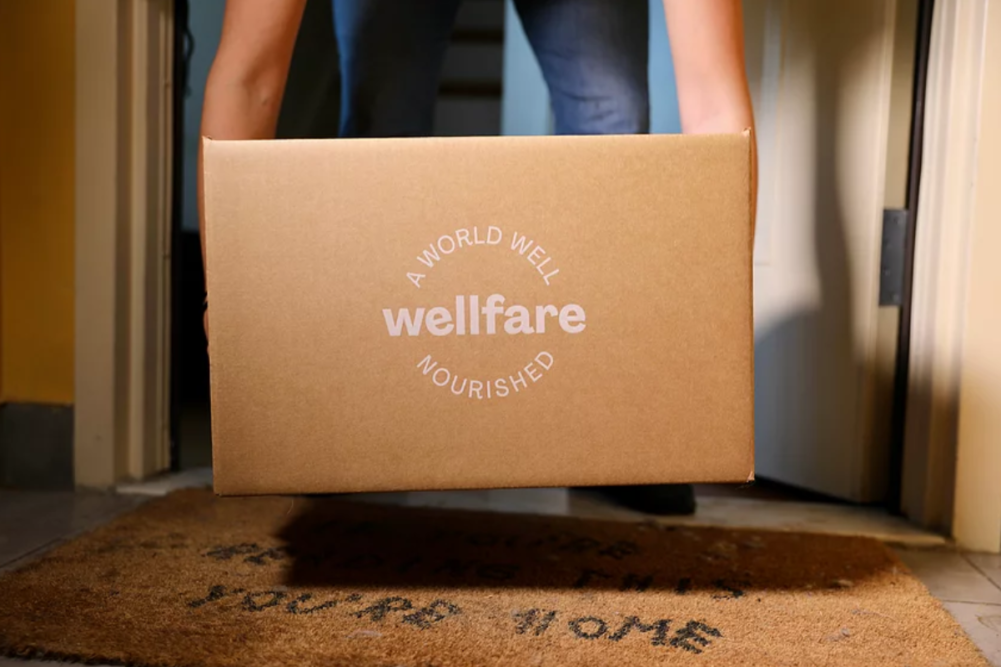NEW YORK — Wellfare is creating a food pantry fit for the 21st century.
The nonprofit delivers healthy products directly to food insecure households in Brooklyn’s Bushwick neighborhood. Co-founders Eva Kerner and Cole Riley created the subscription box service after launching Founders Give, a program that collected and distributed products to hospitals in New York during the height of the COVID-19 pandemic.
Now, they’re aiming to tackle larger issues around food waste and food insecurity. Approximately 40% of the US food supply is wasted each year while 54 million Americans are food-insecure, an issue that typically has been attacked through brick-and-mortar, capital-intensive food pantries.
“The problem is that for people to get the food they need on the table, it comes at a much higher cost than it should,” Ms. Kerner said. “They’re standing in line for hours at a time with no guarantee of actually getting food, and the food that they do get often is not providing the nutrition they’re actually needing.”
With the direct-to-consumer channel taking a larger share of food sales during the pandemic, the pair saw an opportunity to apply learnings from the CPG industry to create a more accessible and seamless food pantry experience.
 “There's a reason why more and more businesses are doing direct-to-consumer,” Mr. Riley said. “It’s clear and easy to understand, the goods are usually higher quality and you get frictionless delivery right to your door.”
“There's a reason why more and more businesses are doing direct-to-consumer,” Mr. Riley said. “It’s clear and easy to understand, the goods are usually higher quality and you get frictionless delivery right to your door.”
Wellfare’s donation network includes more than 300 companies spanning startups like Sound Nutrition and Spudsy to larger companies like Kellogg’s and Hershey. It delivers curated boxes of pantry staples, ready-to-eat snacks and single-serve beverages worth approximately $100 to 1,000 qualified subscribers every two weeks.
The model helps reach more food-insecure households while offering a solution for manufacturers looking to donate product and have a positive social impact.
“We’re talking to brands to understand what they typically do, not only with social impact partnerships where they’re donating market-ready inventory, but also what they’re doing with excess product or product that is close to expiration,” Mr. Riley said. “Some of them have a local partner and are able to donate quite seamlessly. Many others don’t have that type of relationship, so they’re constantly trying to find partners to donate product to.”
Wellfare’s “direct-to-need” model aligns with the innovative ethos behind many of its emerging and specialty brand partners, he added.
“Many of the brands we’re partnering with are incredibly innovative with their products and with their experience, and I don’t think they necessarily want to partner with an archaic nonprofit that has been around for 50 or 100 years,” Mr. Riley said. “They’re looking to align with nonprofits who are trying something different.”
While most organizations focus on providing fresh foods, getting healthier packaged products into hungry hands is key to fighting hunger and reducing waste. The majority of food waste occurs at the consumer level, with spoiled produce, dairy and meat accounting for the lion’s share of uneaten food.
“Donating produce or donating hot meals can be a flash in the pan solution,” Ms. Kerner said. “You’re sort of setting yourself up for failure if that food is going to be put in a refrigerator, forgotten about and then tossed out.”
With most healthy packaged foods carrying a price premium, Wellfare is giving subscribers access to products that typically aren’t available to them, she said. It also is helping eliminate the stigma around welfare programs and receiving free food. Subscribers are treated like customers, with the pair regularly listening to feedback and making adjustments in procurement and customer service to improve the overall experience.
“Even though it’s a free box, we’re approaching it like an actual subscription service,” Mr. Riley said. “The whole experience was designed to elevate the problem out of being this reactive give and receive that you typically see with food insecurity.”
Ms. Kerner and Mr. Riley are gearing up to grow Wellfare’s reach in New York this year before expanding into other cities. Eventually, they hope to deliver boxes across the country.
“We believe we can be the national destination for incoming food donations,” Mr. Riley said.





